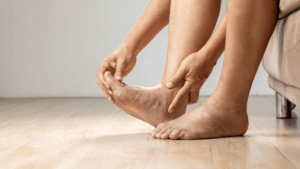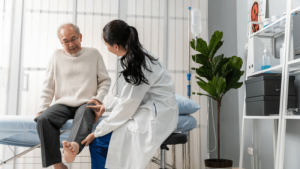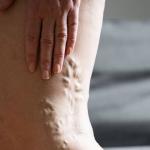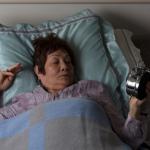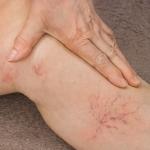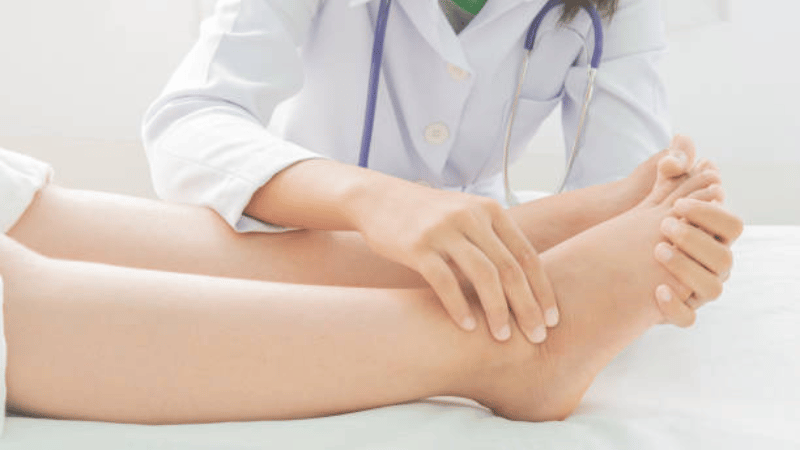
Do your legs often feel heavy, achy, and tired? Is leg fatigue most noticeable after standing or sitting for long periods? This feeling is common, and while it can be caused by everyday activities, weak and heavy legs can also be a sign of varicose veins.
Treatment options are available to manage varicose veins and improve leg health. If you have leg heaviness and other symptoms of vein disease, it’s important to see a vein specialist.
This guide will explore the most common causes of tired legs, including varicose veins, and their related symptoms and treatment options.
Sign Up for Our Health Newsletter
Why Do My Legs Feel So Heavy?
Legs that feel tired occasionally, like after a tough workout, are usually nothing to worry about. However, if you’ve been pushing yourself harder and your legs feel achy or heavy, it might be a sign of overtraining. Your muscles simply need more time to recover. Taking rest days should help.
But what if the heaviness and weakness persist, even without intense exercise? This could indicate an underlying health condition that needs attention, such as chronic venous insufficiency, a treatable condition that impacts millions of adults in America.
Let’s explore some of the most common causes of tired, heavy legs.
Chronic Venous Insufficiency
Chronic venous insufficiency, or vein disease, is the root cause of varicose veins. It can also cause symptoms such as leg pain, swelling, and tiredness.
Venous insufficiency occurs when the valves in the leg veins become damaged. This can happen for several reasons, including high blood pressure, genetics, being overweight, and age.
Early-stage venous insufficiency symptoms include bulging, raised veins and spider veins. As this condition progresses, people start noticing more uncomfortable symptoms, such as leg heaviness and weakness, throbbing pain, and swelling. If left untreated, venous insufficiency can lead to more serious symptoms, such as leg ulcers. It also increases the risk of developing a dangerous blood clot.
Poor Circulation
Venous insufficiency, a common vein disease, occurs when blood struggles to flow back up to the heart from the legs. This happens when the valves in your veins weaken, causing blood to pool in the legs and resulting in a heavy, achy sensation. Poor circulation can exacerbate these symptoms. When your blood vessels don’t allow blood to flow freely throughout the body, you might notice heaviness in the legs, achiness, leg cramps, and swelling.
Contributing factors to poor circulation include dehydration, a sedentary lifestyle, and habits that can increase blood pressure and damage blood vessels, such as smoking or chronic stress.
Peripheral Artery Disease
Peripheral artery disease (PAD) is caused by fatty deposits that accumulate along artery walls. These deposits harden and narrow the arteries, constricting blood flow.
Just like vein disease, PAD primarily impacts the legs. Someone with PAD might have tired, achy legs and pain or cramping in the legs that worsens when walking up the stairs.
Restless Leg Syndrome
Restless leg syndrome (RLS) is characterized by discomfort in the legs. It’s most noticeable when resting. The legs have an uncontrollable urge to move, making it difficult to fall asleep. This condition also causes an aching or heavy feeling in the legs.
There is a correlation between RLS and vein disease.¹ People with fibromyalgia, a chronic condition recognized by widespread pain and tenderness, are also more likely to notice issues with restless legs.²
Lumbar Spinal Stenosis
If the spinal column narrows—which can happen over time because of age, excess weight, or constricted blood vessels from long-term smoking—the spinal canal can become pinched. This can cause pain in the lower back and feelings of heaviness, weakness, or numbness in the legs.
Lymphedema
Lymphedema is characterized by a blockage of lymph fluid. The lymph vessels can’t circulate lymph fluid through the body, causing the fluid to pool, usually in the legs or arms. The vessels might become injured or blocked due to an injury, illness, or inflammation.
Chronic venous insufficiency can also lead to a type of lymphedema.
When someone has venous insufficiency, the lymphatic system drains some of the excess fluid that accumulates in the legs and feet. In severe cases of vein disease, the lymph system becomes overloaded. As a result, it can’t circulate lymph fluid effectively, and even more fluid pools in the lower extremities, leading to heaviness in the legs and more pronounced swelling. This condition is phlebolymphedema: lymphedema caused by issues with the veins (‘phlebo’ means vein).
Symptoms to Watch For if You Have Weak and Heavy Legs
Usually, heaviness in the legs is accompanied by other symptoms such as:
- Aching or throbbing pain that gets better when elevating your legs
- Swelling of the feet, ankles, or legs
- Skin changes, such as itchiness, discoloration, or hardening of the skin
- Varicose veins
If you notice symptoms like leg heaviness, fatigue, and other vein-related issues, it could be a sign of venous insufficiency. It’s important to see a vein specialist who can examine your legs, provide an accurate diagnosis, and create a personalized treatment plan to help you feel better.
If the vein specialists suspect another underlying condition, they can refer you to the appropriate healthcare professional for further evaluation and treatment.
Take Our Free Symptom Assessment
Treatment for Heaviness and Weak Legs
USA Vein Clinics offers multiple vein treatments that address the root cause of weak and heavy legs, including sclerotherapy, Endovenous Laser Therapy (EVLT), and VenaSeal. Our doctors treat damaged veins, helping relieve tiredness, restless leg syndrome, swelling, varicose veins, and other symptoms.
If you have an aching, heavy feeling in your legs, schedule a consultation with a specialist at a vein clinic near you. Find out what’s causing your symptoms and get the treatment you need to feel better.
References:
- Dezube, Aaron R et al. “Correlation between Restless Leg Syndrome and Superficial Venous Reflux.” The International journal of angiology : official publication of the International College of Angiology, Inc vol. 30,4 285-291. 25 Aug. 2021, doi:10.1055/s-0041-1730447
- Viola-Saltzman, Mari et al. “High prevalence of restless legs syndrome among patients with fibromyalgia: a controlled cross-sectional study.” Journal of clinical sleep medicine : JCSM : official publication of the American Academy of Sleep Medicine vol. 6,5 (2010): 423-7.
Medically Reviewed By:
Dr. Yan Katsnelson is a philanthropist, business owner, and highly skilled cardiac surgeon. He is the Founder and CEO of USA Vein Clinics, which is part of USA Clinics Group, the parent company of USA Fibroid Centers, USA Vascular Centers, and USA Oncology Centers, with more than 100 facilities nationwide. Dr. Yan has established himself as a strong advocate for accessibility and affordability of the most advanced medical care close to home. His mission is to create a positive experience for each patient with compassionate, personalized, and expert care.

